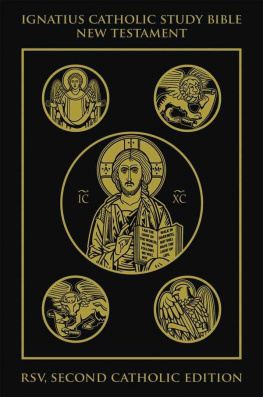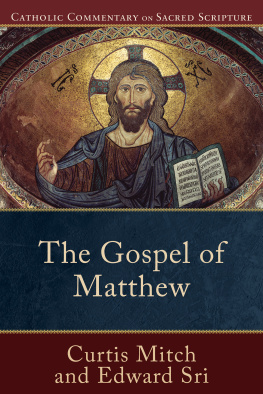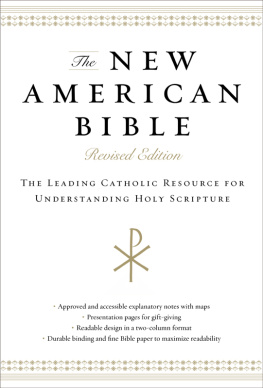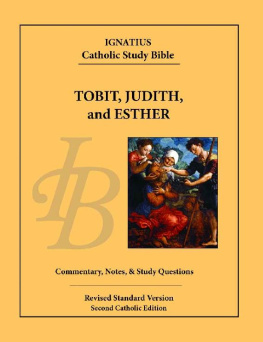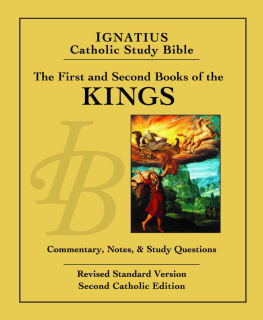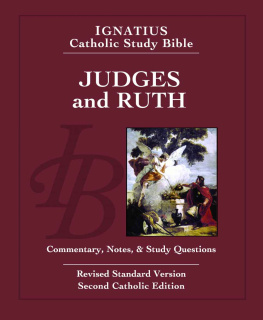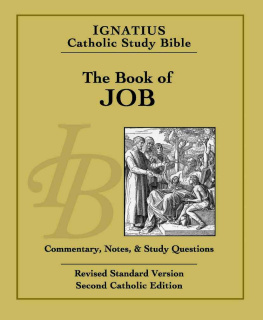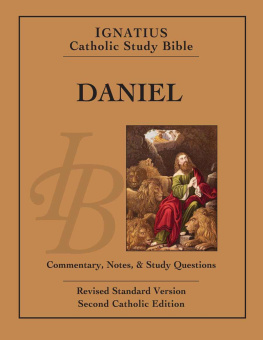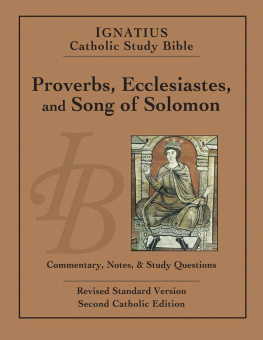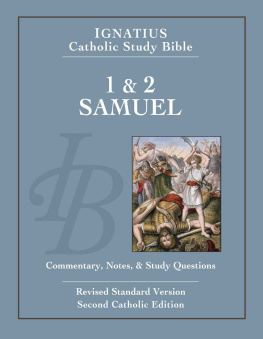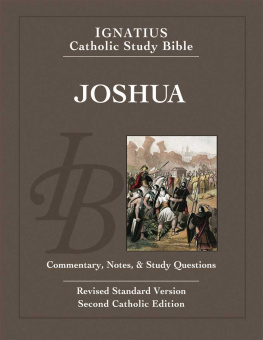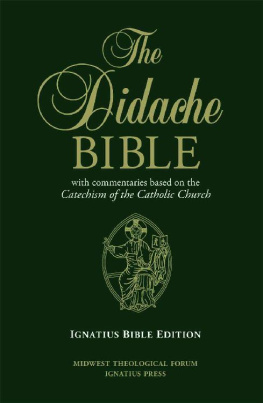THE IGNATIUS CATHOLIC STUDY BIBLE
NEW TESTAMENT
THE IGNATIUS CATHOLIC STUDY BIBLE
Revised Standard Version Second Catholic Edition
THE NEW TESTAMENT
TRANSLATED FROM THE ORIGINAL TONGUES
BEING THE VERSION SET FORTH A.D. 1611
OLD AND NEW TESTAMENTS REVISED A.D. 1881-1885 AND A.D. 1901
COMPARED WITH THE MOST ANCIENT AUTHORITIES
AND REVISED A.D. 1946 AND 1952
THE ORIGINAL CATHOLIC EDITION OF THE RSV TRANSLATION
WAS PREPARED BY THE
CATHOLIC BIBLICAL ASSOCIATION OF GREAT BRITAIN
IN A.D. 1965
THIS EDITION WAS REVISED ACCORDING TO
LITURGIAM AUTHENTICAM
2001
IGNATIUS PRESS SAN FRANCISCO
Published with ecclesiastical approval.
Original RSV Bible text:
Nihil obstat : Thomas Hanlon, S.T.L., L.S.S, Ph.L.
Imprimatur : + Peter W. Bertholome, D.D.
Bishop of Saint Cloud, Minnesota
May 11, 1966
Second Catholic Edition approved under the same imprimatur by the
Secretariat for Doctrine and Pastoral Practices,
National Conference of Catholic Bishops
February 29, 2000
Introduction, commentaries, and notes:
Nihil obstat :Rev. Msgr. J. Warren Holleran, S.T.D.
Imprimatur: + Most Rev. George Niederauer
Archbishop of San Francisco,
January 13, 2010
The nihil obstat and imprimatur are official declarations that a book or pamphlet is free of doctrinal or moral error. No implication is contained therein that those who have granted the nihil obstat and imprimatur agree with the contents, opinions, or statements expressed.
Second Catholic Edition approved by the
National Council of the Churches of Christ in the USA
The Scripture contained herein is adapted from the Revised Standard Version of the Bible, Catholic Edition, copyrighted 1946, 1965, and 1966 by the Division of Christian Education of the National Council of the Churches of Christ in the USA, and it is used by permission. All rights reserved.
Cover art: The Four Evangelists, by Christopher J. Pelicano
Cover design by Roxanne Mei Lum
Published by Ignatius Press in 2010
Bible text: Revised Standard Version, Second Catholic Edition
2000 and 2006 by the Division of Christian Education of the
National Council of the Churches of Christ in the United States of America
All rights reserved
Introduction to the New Testament and Matthew, commentaries, and revisions
2010 by Ignatius Press, San Francisco
All rights reserved
ISBN 978-1-58617-250-3 (PB)
ISBN 978-1-58617-484-2 (HB)
ISBN 978-1-58617-485-9 (LB)
Library of Congress Control Number 200941682
Printed in the United States of America
CONTENTS
THE NEW TESTAMENT
The Gospel according to Saint Matthew
The Gospel according to Saint Mark
The Gospel according to Saint Luke
The Gospel according to Saint John
The Acts of the Apostles
The Letter of Saint Paul to the Romans
The First Letter of Saint Paul to the Corinthians
The Second Letter of Saint Paul to the Corinthians
The Letter of Saint Paul to the Galatians
The Letter of Saint Paul to the Ephesians
The Letter of Saint Paul to the Philippians
The Letter of Saint Paul to the Colossians
The First Letter of Saint Paul to the Thessalonians
The Second Letter of Saint Paul to the Thessalonians
The First Letter of Saint Paul to Timothy
The Second Letter of Saint Paul to Timothy
The Letter of Saint Paul to Titus
The Letter of Saint Paul to Philemon
The Letter to the Hebrews
The Letter of Saint James
The First Letter of Saint Peter
The Second Letter of Saint Peter
The First Letter of Saint John
The Second Letter of Saint John
The Third Letter of Saint John
The Letter of Saint Jude
The Revelation to Saint John (Apocalypse)
INTRODUCTION TO THE IGNATIUS STUDY BIBLE
You are approaching the "word of God". This is the title Christians most commonly give to the Bible, and the expression is rich in meaning. It is also the title given to the Second Person of the Blessed Trinity, God the Son. For Jesus Christ became flesh for our salvation, and "the name by which he is called is The Word of God" (Rev 19:13; cf. Jn 1:14).
The word of God is Scripture. The Word of God is Jesus. This close association between God's written word and his eternal Word is intentional and has been the custom of the Church since the first generation. "All Sacred Scripture is but one book, and this one book is Christ, 'because all divine Scripture speaks of Christ, and all divine Scripture is fulfilled in Christ" (CCC 134). This does not mean that the Scriptures are divine in the same way that Jesus is divine. They are, rather, divinely inspired and, as such, are unique in world literature, just as the Incarnation of the eternal Word is unique in human history.
Yet we can say that the inspired word resembles the incarnate Word in several important ways. Jesus Christ is the Word of God incarnate. In his humanity, he is like us in all things, except for sin. As a work of man, the Bible is like any other book, except without error. Both Christ and Scripture, says the Second Vatican Council, are given "for the sake of our salvation" ( Dei Verbum 11), and both give us God's definitive revelation of himself. We cannot, therefore, conceive of one without the other: the Bible without Jesus, or Jesus without the Bible. Each is the interpretive key to the other. And because Christ is the subject of all the Scriptures, St. Jerome insists, "Ignorance of the Scriptures is ignorance of Christ" (CCC 133).
When we approach the Bible, then, we approach Jesus, the Word of God; and in order to encounter Jesus, we must approach him in a prayerful study of the inspired word of God, the Sacred Scriptures.
Inspiration and Inerrancy The Catholic Church makes mighty claims for the Bible, and our acceptance of those claims is essential if we are to read the Scriptures and apply them to our lives as the Church intends. So it is not enough merely to nod at words like "inspired", "unique", or "inerrant". We have to understand what the Church means by these terms, and we have to make that understanding our own. After all, what we believe about the Bible will inevitably influence the way we read the Bible. The way we read the Bible, in turn, will determine what we "get out" of its sacred pages.
These principles hold true no matter what we read: a news report, a search warrant, an advertisement, a paycheck, a doctor's prescription, an eviction notice. How (or whether) we read these things depends largely upon our preconceived notions about the reliability and authority of their sourcesand the potential they have for affecting our lives. In some cases, to misunderstand a document's authority can lead to dire consequences. In others, it can keep us from enjoying rewards that are rightfully ours. In the case of the Bible, both the rewards and the consequences involved take on an ultimate value.
What does the Church mean, then, when she affirms the words of St. Paul: "All Scripture is inspired by God" (2 Tim 3:16)? Since the term "inspired" in this passage could be translated "God-breathed", it follows that God breathed forth his word in the Scriptures as you and I breathe forth air when we speak. This means that God is the primary author of the Bible. He certainly employed human authors in this task as well, but he did not merely assist them while they wrote or subsequently approve what they had written. God the Holy Spirit is the principal author of Scripture, while the human writers are instrumental authors. These human authors freely wrote everything, and only those things, that God wanted: the word of God in the very words of God. This miracle of dual authorship extends to the whole of Scripture, and to every one of its parts, so that whatever the human authors affirm, God likewise affirms through their words.
Next page
